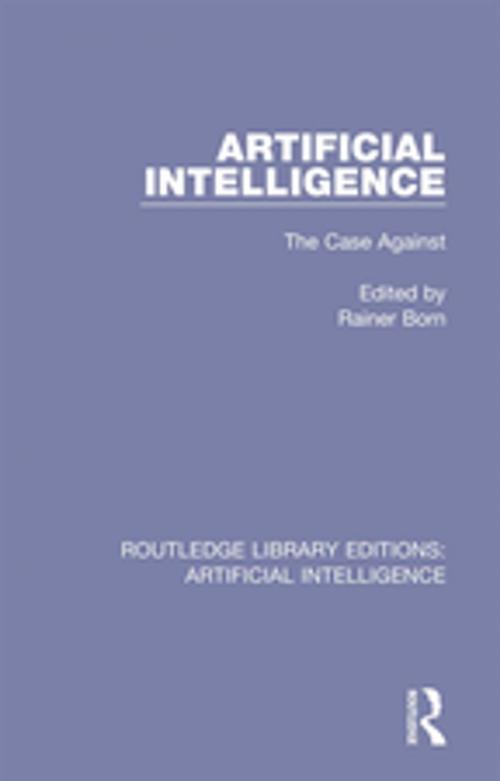Artificial Intelligence
The Case Against
Nonfiction, Computers, Advanced Computing, Artificial Intelligence, Health & Well Being, Psychology| Author: | ISBN: | 9781351141505 | |
| Publisher: | Taylor and Francis | Publication: | May 15, 2018 |
| Imprint: | Routledge | Language: | English |
| Author: | |
| ISBN: | 9781351141505 |
| Publisher: | Taylor and Francis |
| Publication: | May 15, 2018 |
| Imprint: | Routledge |
| Language: | English |
The purpose of this book, originally published in 1987, was to contribute to the advance of artificial intelligence (AI) by clarifying and removing the major sources of philosophical confusion at the time which continued to preoccupy scientists and thereby impede research. Unlike the vast majority of philosophical critiques of AI, however, each of the authors in this volume has made a serious attempt to come to terms with the scientific theories that have been developed, rather than attacking superficial ‘straw men’ which bear scant resemblance to the complex theories that have been developed. For each is convinced that the philosopher’s responsibility is to contribute from his own special intellectual point of view to the progress of such an important field, rather than sitting in lofty judgement dismissing the efforts of their scientific peers.
The aim of this book is thus to correct some of the common misunderstandings of its subject. The technical term Artificial Intelligence has created considerable unnecessary confusion because of the ordinary meanings associated with it, and for that very reason, the term is endlessly misused and abused. The essays collected here all aim to expound the true nature of AI, and to remove the ill-conceived philosophical discussions which seek answers to the wrong questions in the wrong ways. Philosophical discussions and decisions about the proper use of AI need to be based on a proper understanding of the manner in which AI-scientists achieve their results; in particular, in their dependence on the initial planning input of human beings.
The collection combines the Anglo-Saxon school of analytical philosophy with scientific and psychological methods of investigation. The distinguished authors in this volume represent a cross-section of philosophers, psychologists, and computer scientists from all over the world. The result is a fascinating study in the nature and future of AI, written in a style which is certain to appeal and inform laymen and specialists alike.
The purpose of this book, originally published in 1987, was to contribute to the advance of artificial intelligence (AI) by clarifying and removing the major sources of philosophical confusion at the time which continued to preoccupy scientists and thereby impede research. Unlike the vast majority of philosophical critiques of AI, however, each of the authors in this volume has made a serious attempt to come to terms with the scientific theories that have been developed, rather than attacking superficial ‘straw men’ which bear scant resemblance to the complex theories that have been developed. For each is convinced that the philosopher’s responsibility is to contribute from his own special intellectual point of view to the progress of such an important field, rather than sitting in lofty judgement dismissing the efforts of their scientific peers.
The aim of this book is thus to correct some of the common misunderstandings of its subject. The technical term Artificial Intelligence has created considerable unnecessary confusion because of the ordinary meanings associated with it, and for that very reason, the term is endlessly misused and abused. The essays collected here all aim to expound the true nature of AI, and to remove the ill-conceived philosophical discussions which seek answers to the wrong questions in the wrong ways. Philosophical discussions and decisions about the proper use of AI need to be based on a proper understanding of the manner in which AI-scientists achieve their results; in particular, in their dependence on the initial planning input of human beings.
The collection combines the Anglo-Saxon school of analytical philosophy with scientific and psychological methods of investigation. The distinguished authors in this volume represent a cross-section of philosophers, psychologists, and computer scientists from all over the world. The result is a fascinating study in the nature and future of AI, written in a style which is certain to appeal and inform laymen and specialists alike.















